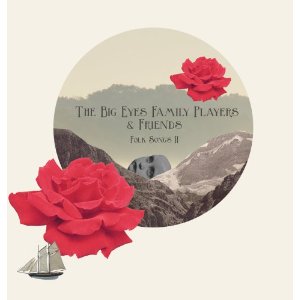James Green’s musical ventures since the turn of the century – initially as bandleader of Big Eyes, later The Big Eyes Family Players, and with a core band plus a spate of guests you might have heard of – have demonstrated his respect for a wide variety of (mostly) folk styles. However, this is not the kind of respect that leads people to admire artifacts from a distance, or preserve them in amber. Green and his regular bandmates (David Jaycock, Brian Ellis and Linsday Aitkenhead) are dilettantes, but implicitly proud to be so: they are not from the Appalachian mountains, or eastern Europe, or formally a chamber group, but regard all these as sonic seams ripe for mining.
Culturally speaking, TBEFP are an indie-rock band, albeit one from indie’s vague left field: most of their releases have been on the Leicester-based Pickled Egg Records. Folk Songs II arrives on Static Caravan, comparably prolific when it comes to coupling folk and avant-garde, and picks up where 2009’s Folk Songs left off. The main difference between that first volume and this sequel is James Yorkston: Folk Songs came together after correspondence between he and Green, but was billed as (and sounded like) a Yorkston album, with TBEFP acting as a backing band for the Fife singer-songwriter. It had much to recommend it, but Folk Songs II is a richer and more varied listening experience. This can be partly credited to the abundance of vocalists across the twelve songs: Yorkston sings lead on two of them, in fact, but eight other UK folkists (including Sharron Kraus, English by birth but largely linked with that whole New Weird America palaver from the mid-00s) place themselves on equal footing.
For ‘Looly, Looly’, a sixteenth century hymn interpreted on an LP by Scotsman Archie Fisher – whose version serves as a guide here – Green’s arrangements are sympathetic to Yorkston’s tender, mellifluous voice. This is not one of Big Eyes’ more outré turns, but still extracts disquieting percussive swell from Jaycock’s synths and glockenspiel, and Aitkenhead’s scrapes of viola. ‘Doffing Mistress’, which Yorkston cribbed from legendary 70s folkie Anne Briggs’ repertoire, adds extra drone-based instruments to the soup, bowed banjo and harmonium combining in celestial fashion. It calls to mind American stargazers like Fursaxa, while lyrics about the drudgery of the weaving mill place it in a very clear working-class English folk lineage. It’s halfway tempting to try and project meaning onto Yorkston’s choice of a song about what was, traditionally, women’s work; as with Green’s cherrypicking of myriad musics, though, he probably thinks this repositioning innocent fun at most.
The album’s only other noteworthy act of unorthodox gender is ‘Farewell Lovely Nancy’, sung by Nancy Elizabeth – whose parents, according to her liner notes, named her after this early nineteenth-century lament. Sung from the perspective of a sailor about to brave the high seas, his other half makes the desperate suggestion – rebuffed with logical coldness – that she dress as a "seaboy" and accompany him. The Lancashire vocalist has never quite clicked for me, in album form at least, but the tale of anguish and farce is clearly telegraphed in her high register. Other songs here, of course, aren’t gendered in any meaningful way. ‘A Man Indeed’, a morbid nursery rhyme also known as ‘Sandy Dawe’ or ‘Sandie Toy’, is tackled by Sharron Kraus and Brighton’s laudable Mary Hampton. The manner in which the duo bounce lyrical fragments off each other, combined with Green’s rumbling, creaking accompaniment, create the remarkable notion of dub forged in the Victorian era. ‘The Clyde Water’, sung by Heather Ditch and in truth one of the album’s less distinguished turns, is sparked into life by two psych-rock organ solos. It’s small beer in the grand scheme of things, but reminds that TBEFP are best at approaching folk from a cheekily inauthentic angle.
Pretty much everyone taking part in Folk Songs II would, you suspect, fail a folk purist’s test. There remains an active folk circuit in Britain, mainly played out in pubs otherwise unsuited to live music; it includes plenty of young people, but has limited interaction with musicians like these, whose solo work is released on labels like Domino, Rough Trade and Drag City. This is not to diminish the work of anyone here, or to suggest their passion for folk is lacking. A few contributors draw on established twentieth century totems of the genre: James William Hindle and Elle Osborne cite interpretations by Nic Jones and the Copper Family for their tracks, while Green enlists Heather Ditch to tilt at the desolation of Shirley Collins’ ‘Bonny Boy’.
Perhaps the most zealous folk archivist present here, though, is Scotland’s Alasdair Roberts, who recently released Urstan, an album of traditional Gaelic songs. Of his two selections, the standout is Ireland-derived album closer ‘Maureen From Gippursland’ – partly because Green and band are heard at their most jazzily off the map, but mostly because its content is, as you’ll see if you scroll down] slightly here, absolute muck. I appreciate that harping on about how the folk ballad canon has a body count on a par with gangsta rap is corny as heck, and makes you sound like a teacher giving it the "Shakespeare was like the Tupac of his day!", but conversely, if anyone you meet is keen to know if there’s a folk equivalent of Ying Yang Twins’ ‘Wait (The Whisper Song)’, this could be a real help. It’s also recommended if you like "she was only the fishmonger’s daughter" type jokes. This hasn’t ruined it all for you, has it? What with this being a lovely album deserving of fruity praise and all.


